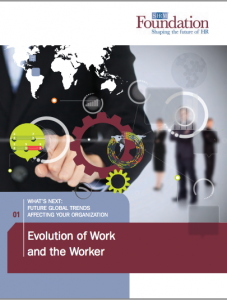 An aging workforce is leading to the departure of many high-level and experienced employees, leaving a huge void of expertise and established skills. At the same time, the Millennials, the youngest generation of employees in the workforce has been found to be restless and hard for employers to retain, according to the Society for Human Resource Management Foundation’s new report on the Evolution of Work and the Worker.
An aging workforce is leading to the departure of many high-level and experienced employees, leaving a huge void of expertise and established skills. At the same time, the Millennials, the youngest generation of employees in the workforce has been found to be restless and hard for employers to retain, according to the Society for Human Resource Management Foundation’s new report on the Evolution of Work and the Worker.
The tactics needed to retain Millennials and unlock their full potential aren’t the same ones that have been proven to work for Baby Boomers and Gen Xers, so companies are going to have to implement new ones, says the report released June 24 at the SHRM 2014 Annual Conference and Exhibition in Orlando, Florida.
I read the report and found plenty of great insights worth noting, including:
Millennials Have Different Motivations
Millennials are less worried about the long term than older generations in today’s workforce and instead crave “an exciting, varied and innovative environment, which offers them rapid career progression.” They also want to be lead by people who give them “the freedom to express their views openly.” Millennials are also more interested in establishing work-life balance than previous generations in the workforce and are less inclined to give up their personal lives in favor of work.
When employers can’t provide them with this — and many can’t or won’t — Millennials aren’t afraid to move on to pursue other opportunities. In fact, a recent report by Georgetown University, found the average Millennial changes jobs 6.3 times between 18 and 25, compared to 5.5 times for the average Baby Boomer at the same age.
All that turnover is expensive for employers, so its essential they adapt to engage Millennials and make them want to stay. And higher salaries alone won’t do it, because Millennials are less motivated by money than other factors. Employers will need to explore different combinations of benefits packages, advancement opportunities, work environments and other variables to find what will work to keep Millennials engaged.
It won’t be easy, though, because employers are starting at a disadvantage. Gallup’s latest 142-country study on the global workforce reveals a huge disconnect between most workers and their jobs. Sixty-three percent of the employees surveyed are “not engaged” with their work, 24 percent are “actively not engaged” with their work and only 13 percent of the workers reported feeling “engaged.”
Millennials Need Training
Many Millennials will leave the education system with a degree and not much else companies are looking for in employees. A 2013 SHRM study on the main weaknesses of job applicants as seen by businesses found the primary problems were not a lack of qualifications or a poor cultural fit, but rather 52 percent of the companies surveyed said young applicants’ biggest shortcoming was an absence of soft skills, including creative thinking, adaptability and interpersonal communication.
To foster a greater chance of a Millennials becoming good employees after graduation, companies should develop working relationships with educational institutions so they can ensure those institutions are teaching contemporary business issues and strategies, says the SHRM Foundation report.
For employers without the time, resources or ability to work closely with educational institutions, an alternative is to create in-house training and development systems. Training internally unifies the knowledge and experiences of young employees coming from different backgrounds and universities. For example, since 2002 a staggering 100,000 employees of IT services company Infosys graduated from an internal university that teaches recruits to write code and formulate algorithms.
If you want to learn more about how to make your organization Millennial-friendly, download my new white paper:

